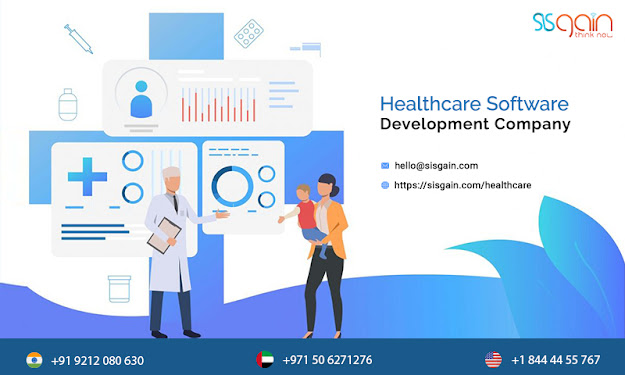Creating Best Healthcare Software Means Empowering Healthcare Delivery
In an epoch when trailblazing technology is renovating virtually every
characteristic of human existence, healthcare institutions and providers
require best healthcare software explanations that will not merely simplify care delivery but
will also expedite their manners and eventually enhance patient results. Today,
healthcare institutions and clinicians are under additional burden than anywise
before to deliver patient-centric assistance, cut expenses, and operate more
efficiently. Custom healthcare software can improve by strengthening
accessibility, productivity, portability, and scalability.
Formulating appealing, versatile, and
high-performance healthcare software is distinct from conventional employment
software. It names for a profound understanding of not simply the technology
itself but moreover interoperability, regulatory, and safety regulations, as
well as user requirements.
THE HEALTHCARE INDUSTRY
The commerce incorporates hospitals, clinics, and distinct firms that:
(i) deliver clinical assistance,
(ii) propose healthcare-related backing aids such as medical coverage,
or
(iii) expand medical appliances and medications.
The healthcare industry embodies an expanse of sub-industries, with each sub-industry concentrating on a precise area. The three primary healthcare sub-industries are:
- Life sciences, which comprises of med-tech, manufacturers, drug industry;
- Healthcare providers, involving clinics, medical exploration capabilities, physicians;
- Healthcare financial assistance, such as medical protection carriers.
A prosperous healthcare network establishes cordial connections and
seamless alliance among these pivotal components, encompassing healthcare
insurers, medical appliance providers, pharmaceuticals, government agencies,
medical administrators, nurses, doctors, and so on.
Why
Should Healthcare Software be constructed?
Digital outcomes make the medical
procedure more personalized, swiveling it into any-time, any-place, consecutive
vigilant. Hence we are glimpsing the innovation of a unique industry prototype
— a customer-centered digital healthcare ecosystem.
Digital healthcare app development intends to build a
solitary knowledge area of differing scalability, from a standalone clinical
organization to a restricted system, with the assistance of mobile app
improvement, cloud computing, web, and different technologies. Information
policies and systems assemble a credible relationship between patients, medical
specialists, and healthcare providers, which is portable and effective for all
the parties.
Categories of Medical Software
Contemporary clinical organizations are
exempted from unreasonable paperwork and can seamlessly organize various
procedures due to the varied samples of medical software.
1. Practice
Management System:
This is a consumer relationship
management (CRM) network for medical exercises. The software incorporates all
clinical and executive techniques and assists users to rectify them more
efficiently. As a result, the method optimizes workflow, curtails the duration
and money expenditures, and furnishes generous patient supervision.
The exercise management software may
comprise numerous ramifications such as:
A
scheduling explanation —
sufferers can make an online meeting on their own via any portable appliance,
which streamlines a scheduling procedure and diminishes phone exchange.
A
billing remedy —
clinics can automate all expenditure protocols and security requests
An
e-prescription antidote —
physicians deliver medications immediately to pharmacies in just a limited
click, conserving time and abolishing errors that may arise because of
ambiguous handwriting; moreover, the network maintains the route of patients’
records and requirement of medications, contributing to a decent degree of
safety.
2. EMR:
An electronic medical records (EMR)
configuration is a digital opportunity to a library of paper reports. This is
one of the largely prominent custom healthcare app development that facilitates the basic
labor of doctors with documents and reports.
3. EHR:
Electronic health records software (EHR) is identical to an EMR one, but
it is more extensive. If data from EMRs can be disseminated only within one
department, EHRs are prepared to transport data to different clinical
institutions and infirmaries. It is significant in serious cases when evidence
from a patient’s health record is required within a matter of moments.
4. Patient
Portals and Mobile Apps:
Contemporary sufferers are anxious to be
committed to the medical procedure, be more enlightened, and direct a healthy
lifestyle. This is the juncture when telemedicine and digital health are coming
at the forefront.
Patient outlets deliver numerous
engagement tools:
- Online meetings
- Online talks
- Online billing
- Acknowledgment
- Academic data
Manual on Creating Medical Software
1. Distinguish Your Target
Audience:
Before commencing to formulate custom
medical software, one should certainly infer who the probable users are and
what is of supreme importance to them.
An in-depth examination of the target audience’s
desires and needs will benefit both the customer and the dealer to attain a
detailed intuition of the future outcome. Accordingly, it will be susceptible
to determining what characteristics should be included and what technologies
should be executed.
When healthcare app developers solidify a powerful
relation with possible users, they are competent to provide a much reasonable
commodity.
2. Instruct on Functional Configuration:
The hierarchy of software constantly
banks on its purposes. As soon as one distinguishes what purposes his/her
application will conduct, the person can envision its pattern.
3.
Layout User-Friendly UI/UX:
To build a consistent and easy-to-use
explanation, software designers and makers unite to assemble a user interface
(UI) and build a user experience (UX) founded on end-customer intentions.
4.
Deliver Data Protection:
Compiling medical data through digital
health technologies, as well as its repository and processing develop enormous
dangers of susceptible private evidence leakage and cyber-attacks. Hence,
protection confirmation must be a prerogative.






Digital transformation in healthcare is the positive impact of technology in healthcare. Telemedicine, artificial intelligence (AI)-enabled medical devices, and blockchain electronic health records are just a few concrete examples of digital transformation in healthcare.
ReplyDeleteLooking for the Healthcare App Solutions Providers? Reach Way2Smile Solutions DMCC.
ReplyDeleteits really approaching and appealing content for reading and implementation purpose.
IT Services Dubai